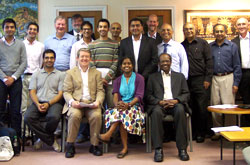Hindu plans for environmental change launched at OCHS

Environmental Leaders at the OCHS
Friday, 17 July 2009
National Hindu leaders have pledged to work together to create long-term plans for environmental protection and education which have the potential to reach every Hindu living in the UK. Ideas considered include a Hindu benchmark for a range of products and services, endorsement for ethically sourced food, and advocating sustainable lifestyles. These plans will be developed and implemented over the next nine years – a timeframe chosen to encourage long-term planning.
The leaders met on Thursday 16 July, at the Oxford Centre for Hindu Studies as part of an international initiative led by the Alliance of Religions and Conservation (ARC) and the OCHS, and backed by the United Nations Development Programme. Working with 11 world faiths, ARC is helping each to develop long-term plans for environmental protection. This built on an initial meeting in April aimed at developing relationships and exploring possibilities.
Ranchor Prime, researcher on Hindu environmental issues explained, 'Food has always been at the heart of the Hindu way of life. Now with food, and especially the environmental cost of meat, right at the top of the global climate change agenda, Hindus feel they have something to say. One of their key concerns is to change public perceptions of the cow as simply a source of food.'
Facilitated by the OCHS, the meeting had over 20 representatives from various Hindu temples and organisations in the UK. This was the first time that UK Hindu leaders had come together to address issues concerning the environment on a common platform. With the support of ARC and the UN, the participants unanimously agreed to the initiative. They also pledged to work closely together, sharing knowledge and resources. This work will be done under the banner of 'Bhumi: Protecting the living planet – Hindu plans for generational change'.
'There are over three-hundred Hindu temples and organisations in the UK.' noted Shaunaka Rishi Das, Director of the OCHS. 'If they can work together to inspire their congregations to make changes, we can make a real contribution to the environmental goals of this country. This meeting was historical because the larger Hindu temples in the UK have agreed to work together as never before, which is very encouraging and a very good example.'
As each temple now works to produce its nine-year plan, work is underway to bring onboard and link up with Hindu temples and organisations from America and India.
Martin Palmer, Secretary General of ARC, commented, 'The ideas, commitments, and willingness to work together seen here today is extraordinary and marks a major step forward for both the environment and Hinduism in this country. Our challenge now is to take this inspiring and practical model out from the UK to the USA and back to India itself. India is one of the three countries which will decide the environmental future of the world.'
The creation of a nine-year plan that was agreed on today will cover seven key areas:
1. Assets: A look into current assets owned by temples and organisations and how best to manage them in an environmentally friendly manner.
2. Education: Inclusion of environmental matters alongside, or integrated with, education on Hindu beliefs and practices. Starting environmental projects in Hindu schools for young people to become actively involved in environmental issues.
3. Pastoral care: Help make environmentally friendly living a part of the daily lives of Hindus.
4. Lifestyles: Look at how the Hindu faith as a whole can make environmentally friendly choices, for example, bulk buying bio-degradable cutlery for temples and cardbon-offsetting pilgrimages to India.
5. Media and advocacy: Reach out to government and to other faiths, explaining what the Hindu faith is doing and asking them to support us. Promote environmental issues in Hindu media.
6. Partnerships and eco-twinning: Link with other groups who are working on similar plans.
7. Celebration: Consciously recognise the role of nature in Hindu festivals. Raise awareness through a renewed appreciation in the natural beauty of the world.
Below, Martin Palmer, Secretary-General of ARC speaks about the importance of the Hindu 9 Year Plan.
